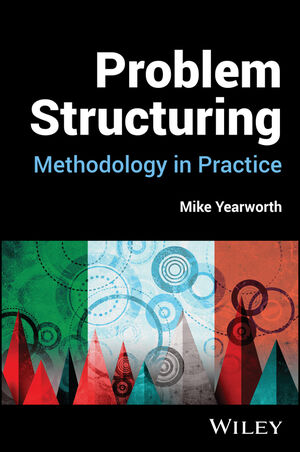Problem Structuring : Methodology in Practice

Current perspectives on approaches to problem structuring in operational research and engineering and prospects for problem structuring methods applicable to a wide range of practice.
Despite the myriad successes of Operational Research (OR) in government and industry, critique of its continued relevance to complex, wicked problems led to the emergence and evolution of Soft OR as a more humanist orientation of the discipline centred on a methodological framing of techniques known as Problem Structuring Methods (PSMs). These have enabled OR practitioners to broaden the scope of OR to address complex problem contexts that require transforming, planning and strategising interventions for their clients. The original core PSMs of Soft Systems Methodology (SSM), Strategic Options Development and Analysis (SODA) and the Strategic Choice Approach (SCA) are presented using a new analytical framework based on constitutive rules, epistemologies, and affordances of the modelling approach. Practical considerations in PSM based interventions are discussed emphasising trust-building, stakeholder identification, facilitation and ethical practice. A wide range of PSM applications are surveyed demonstrating clear intersections with communities of practice grounded in the applied social sciences. The development of a new PSM based on Hierarchical Process Modelling (HPM) of purpose arising from a processual turn in engineering practice offers additional insights for the practice of Soft OR. New developments in PSM practice built on use of Group Support Systems (GSS) and exploiting developments in machine learning are presented. Prospects for bringing the Soft OR project back into better alignment with mainstream OR are discussed in the context of new education programs and a possible processual turn in OR.
Problem Structuring: Methodology in Practice contains four linked sections that cover:
- Problem formulation when dealing with wicked problems, justification for a methodological approach, the emergence of soft OR, the relevance of pragmatic philosophy to OR practice.
- Traces debates and issues in OR leading to the emergence of soft OR, comparative analysis of PSMs leading to a generic framework for soft OR practice, addressing practical considerations in delivering PSM interventions.
- Charts the emergence of a problem structuring sensibility in engineering practice, introduces a new PSM based on hierarchical process modelling (HPM) supported by teaching and case studies, makes the case for a processual turn in engineering practice supported by HPM with relevance to OR practice.
- Evaluation of PSM interventions, survey of applications, use of group support systems, new developments supported by machine learning, re-contextualising soft OR practice.
Problem Structuring: Methodology in Practice is a thought-provoking and highly valuable resource relevant to all “students of problems.” It is suitable for any UK Level 7 (or equivalent) programme in OR, engineering, or applied social science where a reflective, methodological approach to dealing with wicked problems is an essential requirement for practice.
- Institutional access via Wiley Online Library
- Order via Wiley
- Order at Amazon UK (Hardcover and Kindle)
- Order at Amazon.com (Hardcover and Kindle)
Note that some institutions may have access via their usual eBook provider (e.g. ProQuest, Perlego), if not by default on the subscription then by a separate order for this specific title.
